Are you wondering if you can travel to Morocco during Ramadan? The answer is a resounding yes, and TRAVELS.EDU.VN is here to guide you through this unique cultural experience, offering insider tips and services to make your trip seamless and unforgettable. Embark on a journey of cultural immersion during this sacred month. Let TRAVELS.EDU.VN help you discover the beauty of Ramadan in Morocco!
1. Understanding Ramadan: A Sacred Month
Ramadan is a month of profound significance in the Islamic faith. As one of the Five Pillars of Islam, it’s a time of spiritual reflection, increased devotion, and acts of charity. The Islamic calendar is lunar, meaning Ramadan shifts approximately 10 days earlier each year. During this month, Muslims abstain from eating, drinking, and other physical needs from dawn until sunset. This isn’t just about physical abstinence; it’s also about purifying the mind and soul, focusing on prayer, and strengthening community bonds.
Imagine waking before sunrise for suhoor, the pre-dawn meal, then observing a fast throughout the day. The day culminates in iftar, the evening meal that breaks the fast, shared with family and friends, creating a sense of unity and gratitude.
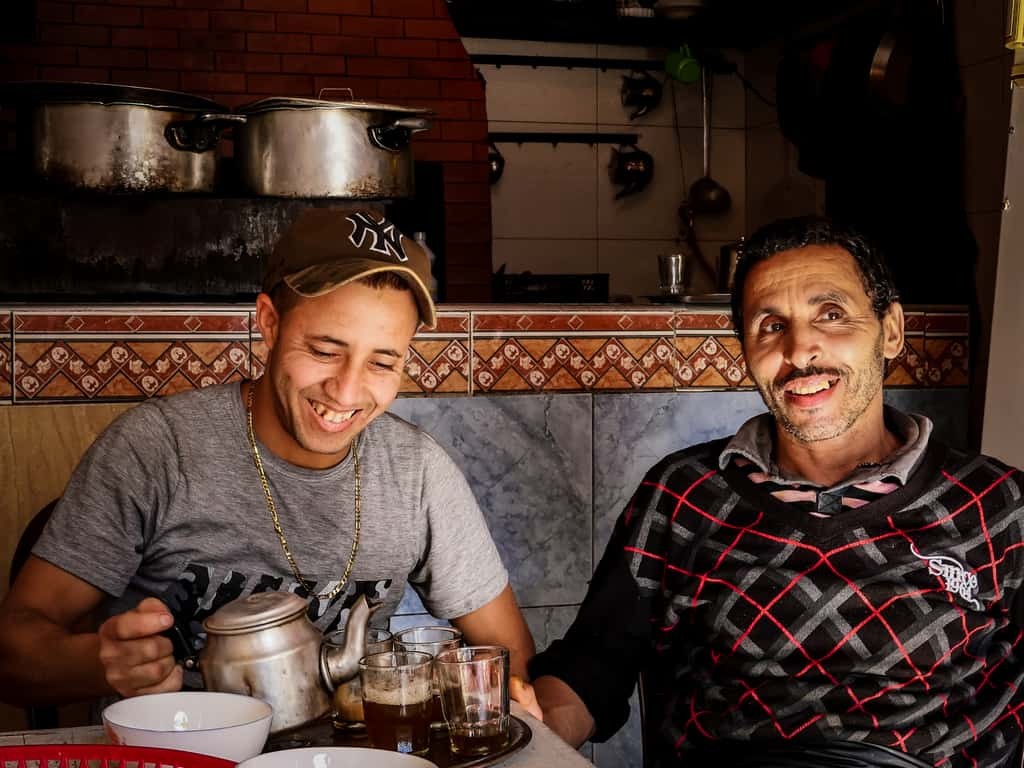 Celebrating the spirit of togetherness with family and friends during Iftar, embodying the essence of Ramadan in Morocco
Celebrating the spirit of togetherness with family and friends during Iftar, embodying the essence of Ramadan in Morocco
2. Experiencing Ramadan as a Foreigner: What to Expect
Many travelers wonder what it’s like to visit Morocco during Ramadan. Contrary to common misconceptions, Morocco welcomes foreigners during this time, and while adjustments are necessary, it can be a rewarding experience.
2.1. Daytime Considerations
While the majority observes the fast, life doesn’t grind to a halt. Many shops and businesses operate on modified schedules, often opening later in the morning and closing earlier in the evening. Finding restaurants open during the day might be challenging, especially in smaller towns. However, in larger cities like Marrakech, Casablanca, and Rabat, some establishments cater to tourists.
| City | Restaurant Availability During Ramadan |
|---|---|
| Marrakech | Some restaurants open for tourists |
| Casablanca | Some restaurants open for tourists |
| Rabat | Some restaurants open for tourists |
| Fes | Limited options, primarily in tourist areas |
| Chefchaouen | Very limited options; plan ahead |
It’s advisable to plan ahead by:
- Stocking up on supplies: Purchase snacks and water from supermarkets or smaller stores that remain open, usually in the afternoon.
- Utilizing hotel services: Many hotels offer room service or have restaurants that remain open for guests.
- Being discreet: While not required to fast, avoid eating, drinking, or smoking in public out of respect for those who are.
2.2. The Magic of Iftar
As the sun sets, the atmosphere transforms. The call to prayer signals the beginning of iftar, and the streets come alive with families and friends gathering to break their fast. Many restaurants offer special iftar menus, featuring traditional dishes like harira soup, dates, and pastries. It’s a unique opportunity to savor authentic Moroccan cuisine and experience the warmth of Moroccan hospitality.
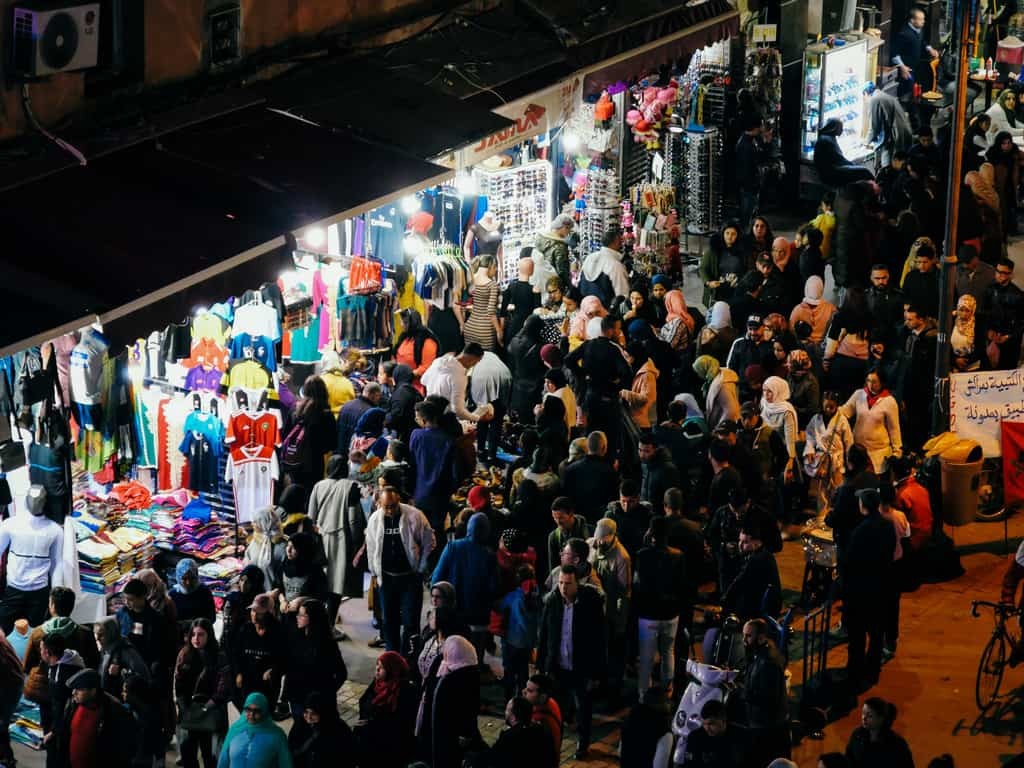 Sharing Iftar with the community in Marrakech during Ramadan offers an immersive cultural experience, showcasing the vibrant spirit of Moroccan traditions
Sharing Iftar with the community in Marrakech during Ramadan offers an immersive cultural experience, showcasing the vibrant spirit of Moroccan traditions
2.3. Post-Iftar Festivities
After iftar, the evenings are filled with a lively atmosphere. Markets stay open late, offering a variety of goods and delicious treats. Mosques are beautifully illuminated, and many people attend special evening prayers called tarawih.
2.4. Eid al-Fitr: The Sweet Celebration
The end of Ramadan is marked by Eid al-Fitr, a joyous celebration characterized by special prayers, family gatherings, and festive meals. It’s a time of gratitude, forgiveness, and community spirit. Experiencing Eid al-Fitr is a memorable way to conclude your Ramadan journey in Morocco.
3. TRAVELS.EDU.VN: Your Ramadan Travel Partner
At TRAVELS.EDU.VN, we understand the unique considerations of traveling during Ramadan. That’s why we offer tailored services to ensure a smooth and enriching experience.
3.1. Custom Itinerary Planning
Our expert travel consultants can create personalized itineraries that take into account Ramadan’s specific needs. We can recommend accommodations with suitable dining options, arrange private transportation, and suggest activities that respect the cultural context.
3.2. Authentic Cultural Experiences
We can connect you with local families for an iftar meal, arrange visits to mosques (where appropriate), and provide insights into Ramadan traditions and customs. These experiences offer a deeper understanding of Moroccan culture and foster meaningful connections with the local community.
3.3. Reliable Information and Support
We provide up-to-date information on opening hours, transportation schedules, and local customs. Our team is available 24/7 to answer your questions and provide assistance throughout your trip.
4. Is Ramadan Travel Right for You? Weighing the Pros and Cons
Deciding whether to travel to Morocco during Ramadan depends on your personal preferences and travel style.
4.1. The Allure of Ramadan Travel: Embracing the Spiritual Atmosphere
- Cultural Immersion: Ramadan offers a unique opportunity to witness Moroccan culture at its most devout and communal. The spiritual atmosphere is palpable, and the traditions are captivating.
- Hospitality: Moroccans are known for their hospitality, and during Ramadan, this is often amplified. You may find yourself invited to share iftar with local families, offering a genuine connection to the community.
- Lower Prices: Accommodation prices in major cities can be lower during Ramadan, making it a budget-friendly time to travel.
4.2. Potential Challenges: Navigating Daily Life
- Limited Services: Some businesses operate on reduced hours, and finding open restaurants during the day can be challenging.
- Heat: If Ramadan falls during the summer months, the combination of fasting and hot weather can be demanding for locals and tourists alike.
- Cultural Sensitivity: It’s essential to be mindful of local customs and avoid eating, drinking, or smoking in public during fasting hours.
5. Essential Tips for Traveling to Morocco During Ramadan
To make the most of your Ramadan journey in Morocco, consider these helpful tips:
5.1. Plan Ahead
Research opening hours for attractions, restaurants, and shops. Book accommodations and transportation in advance, especially if traveling during peak season.
5.2. Pack Appropriately
Dress modestly, especially when visiting religious sites. Pack comfortable shoes for walking, as you may be doing a lot of exploring on foot.
5.3. Stay Hydrated
Even if you’re not fasting, it’s essential to stay hydrated, especially in the warm climate. Carry a water bottle and refill it whenever possible.
5.4. Learn Basic Arabic Phrases
Learning a few basic Arabic phrases, such as Ramadan Mubarak (Blessed Ramadan) and Ramadan Kareem (Generous Ramadan), will be appreciated by locals.
5.5. Be Respectful
Show respect for those who are fasting by avoiding eating, drinking, or smoking in public during fasting hours. Be mindful of noise levels, especially during prayer times.
5.6 Embracing Moroccan Ramadan Greetings
During Ramadan, Moroccans greet each other with special phrases that reflect the spirit of the holy month. The most common greeting is “Ramadan Mubarak,” which translates to “Blessed Ramadan.” You can respond with “Ramadan Kareem,” meaning “Generous Ramadan.” Using these phrases is a thoughtful way to show respect and participate in the local culture.
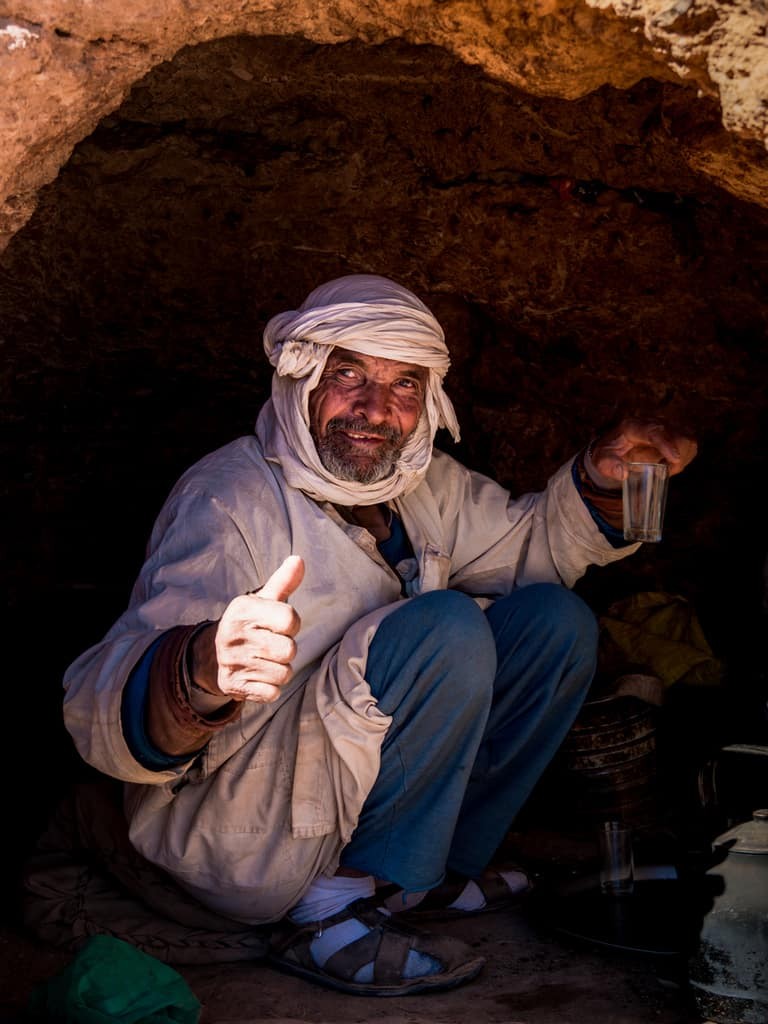 Sharing tea is a common and welcoming gesture of Moroccan hospitality during Ramadan
Sharing tea is a common and welcoming gesture of Moroccan hospitality during Ramadan
6. What about Moroccans Who Don’t Fast?
It’s worth noting that not all Moroccans fast during Ramadan. There are various reasons why someone might not participate, including health conditions, travel, or personal choice. While those who don’t fast typically do so discreetly out of respect for those who are, it’s a reminder that Morocco is a diverse country with varying levels of religious observance.
6.1 Exceptions to Fasting
Certain groups are exempt from fasting, including:
- Travelers: Those undertaking a journey are permitted to break the fast.
- The Sick: Individuals with health conditions that make fasting difficult or dangerous are exempt.
- Pregnant or Breastfeeding Women: Women in these conditions can postpone fasting until a later date.
- Children: Fasting is not required for children.
7. Debunking Ramadan Myths
There are many misconceptions about Ramadan, especially for those unfamiliar with Islamic culture. Let’s address some common myths:
Myth 1: Everything is closed during Ramadan
While some businesses have reduced hours, many shops, restaurants, and attractions remain open, particularly in tourist areas.
Myth 2: It’s impossible to find food during the day
While it may require some planning, it’s possible to find food during the day, especially in larger cities. Hotels often have restaurants that cater to non-fasting guests, and some smaller shops remain open in the afternoon.
Myth 3: Foreigners are expected to fast
Foreigners are not expected to fast, but it’s important to be respectful of those who are by avoiding eating, drinking, or smoking in public during fasting hours.
Myth 4: Ramadan is a somber occasion
While Ramadan is a time of spiritual reflection, it’s also a time of community, celebration, and generosity. The evenings are often filled with lively gatherings and festive meals.
8. A Traveler’s Perspective: Ramadan in Morocco
Imagine yourself wandering through the bustling souks of Marrakech, the air filled with the aroma of spices and the sounds of bartering. As the sun begins to set, you hear the call to prayer echoing from the minarets, signaling the end of the day’s fast. You join a local family for iftar, sharing a delicious meal and engaging in warm conversation. This is Ramadan in Morocco – an immersive cultural experience that will stay with you long after you’ve returned home.
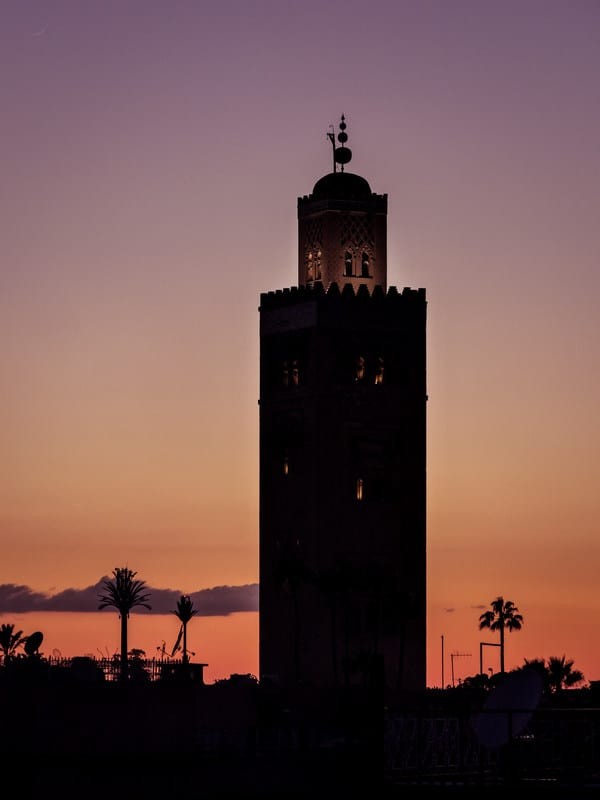 Men pausing for prayer in the heart of Marrakech, reflecting the spiritual essence of Ramadan
Men pausing for prayer in the heart of Marrakech, reflecting the spiritual essence of Ramadan
9. Beyond Fasting: Exploring the Essence of Ramadan
Ramadan is about much more than just abstaining from food and drink. It’s a time for:
9.1. Reflection and Self-Improvement
Muslims use this month to reflect on their lives, identify areas for improvement, and strengthen their connection with God.
9.2. Charity and Generosity
Giving to those in need is an essential part of Ramadan. Many Muslims donate to charities or volunteer their time to help others.
9.3. Strengthening Community Bonds
Ramadan is a time for families and communities to come together, share meals, and support each other.
9.4. Increased Prayer and Devotion
Muslims often increase their prayers and read the Quran more frequently during Ramadan.
10. Making the Most of Your Visit: Practical Tips and Etiquette
To ensure a respectful and enjoyable experience, here are some practical tips:
10.1. Dress Modestly
When visiting religious sites or public areas, dress modestly, covering your shoulders and knees.
10.2. Ask Permission Before Taking Photos
Always ask permission before taking photos of people, especially during prayer times.
10.3. Be Mindful of Noise Levels
Be mindful of noise levels, especially near mosques or during prayer times.
10.4. Learn Some Basic Arabic Phrases
Learning a few basic Arabic phrases will be appreciated by locals and can enhance your interactions.
10.5. Embrace the Experience
Be open to trying new things, engaging with locals, and learning about Moroccan culture.
11. Understanding the Impact on Daily Life During Ramadan
Ramadan affects various aspects of daily life in Morocco. Here’s what you need to know:
11.1. Business Hours
Many businesses operate on reduced hours, opening later in the morning and closing earlier in the evening. Banks and government offices may also have shorter hours.
11.2. Transportation
Public transportation may be less frequent during the day. Plan your travel accordingly and allow for extra time.
11.3. Alcohol
The sale and consumption of alcohol are restricted during Ramadan. Most bars and restaurants do not serve alcohol during this month.
11.4. Entertainment
Some forms of entertainment, such as live music and dancing, may be limited during Ramadan.
12. The Best Places to Visit in Morocco During Ramadan
While all of Morocco is worth exploring, some destinations are particularly appealing during Ramadan:
12.1. Marrakech: A City of Culture and Cuisine
Experience the vibrant atmosphere of Djemaa el-Fna at night, sample delicious iftar dishes, and explore the historic medina.
12.2. Fes: A Spiritual and Artistic Hub
Visit the Al-Attarine Madrasa, explore the tanneries, and immerse yourself in the city’s rich cultural heritage.
12.3. Chefchaouen: The Blue Pearl
Wander through the picturesque blue-washed streets, enjoy the tranquility of the Rif Mountains, and experience the unique charm of this small town.
12.4. The Sahara Desert: A Serene Escape
Escape the hustle and bustle of the cities and experience the peace and serenity of the Sahara Desert. Enjoy stargazing, camel trekking, and traditional Berber hospitality.
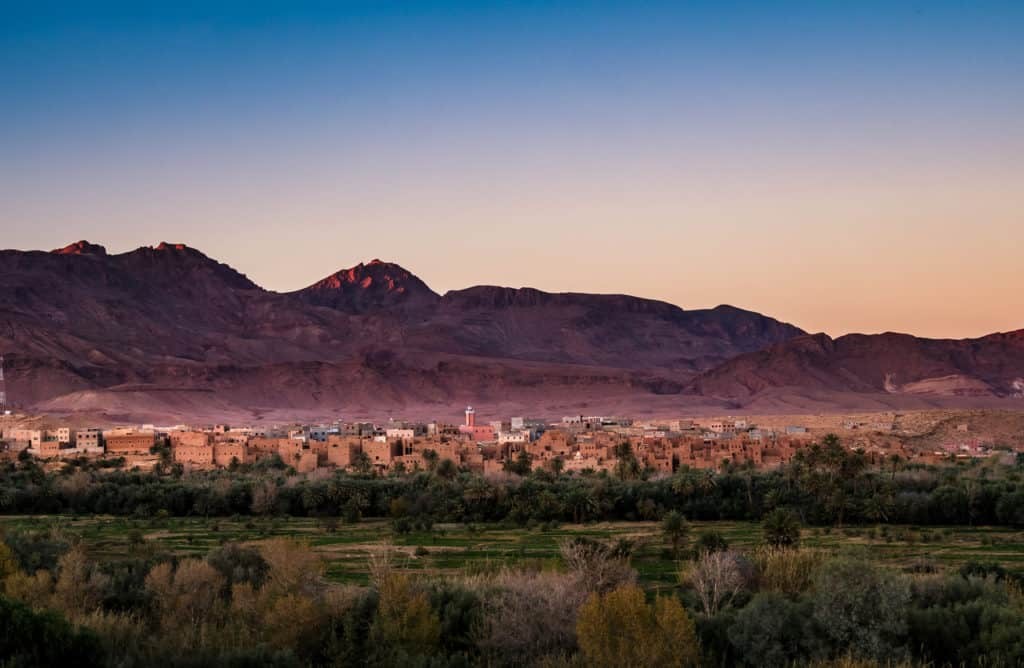 Experiencing the serene beauty of the Sahara Desert under the starlit sky provides a tranquil contrast during the spiritual month of Ramadan in Morocco
Experiencing the serene beauty of the Sahara Desert under the starlit sky provides a tranquil contrast during the spiritual month of Ramadan in Morocco
13. Dress Code Considerations for Ramadan
Modesty is particularly important during Ramadan. When visiting religious sites or public areas, it’s advisable to dress conservatively, covering your shoulders, arms, and legs. Loose-fitting clothing is also recommended, especially during the hot summer months.
13.1. Women
Women should wear loose-fitting clothing that covers their shoulders, arms, and legs. A headscarf is not required unless visiting a mosque.
13.2. Men
Men should avoid wearing shorts or sleeveless shirts in public areas. Long pants and shirts with sleeves are recommended.
14. Navigating Transportation Options During Ramadan
Transportation schedules may be affected during Ramadan. It’s advisable to plan your travel in advance and allow for extra time.
14.1. Taxis
Taxis are readily available in most cities, but they may be more difficult to find during iftar time.
14.2. Buses
Bus schedules may be less frequent during the day. Check the schedules in advance and allow for extra time.
14.3. Trains
Train schedules are generally less affected by Ramadan. However, it’s advisable to book your tickets in advance, especially if traveling during peak season.
15. FAQs About Traveling to Morocco During Ramadan
Here are some frequently asked questions to help you plan your trip:
1. Is it safe to travel to Morocco during Ramadan?
Yes, Morocco is generally a safe country to visit during Ramadan. However, it’s always important to be aware of your surroundings and take precautions against petty theft.
2. Do I need to fast if I travel to Morocco during Ramadan?
No, foreigners are not required to fast. However, it’s important to be respectful of those who are by avoiding eating, drinking, or smoking in public during fasting hours.
3. Will I be able to find food during the day?
It may require some planning, but it’s possible to find food during the day, especially in larger cities. Hotels often have restaurants that cater to non-fasting guests, and some smaller shops remain open in the afternoon.
4. What should I wear during Ramadan?
Dress modestly, covering your shoulders, arms, and legs. Loose-fitting clothing is also recommended, especially during the hot summer months.
5. Can I visit mosques during Ramadan?
Some mosques are open to non-Muslims, but it’s important to dress modestly and remove your shoes before entering. Ask permission before taking photos.
6. How can I show respect for those who are fasting?
Avoid eating, drinking, or smoking in public during fasting hours. Be mindful of noise levels, especially near mosques or during prayer times.
7. What is Eid al-Fitr?
Eid al-Fitr is the celebration that marks the end of Ramadan. It’s a time of special prayers, family gatherings, and festive meals.
8. Will shops be open during Eid al-Fitr?
Many shops will be closed on the first day of Eid al-Fitr, but they will typically reopen on the following days.
9. Are there any special events or activities during Ramadan?
Many cities host special events and activities during Ramadan, such as cultural performances, religious lectures, and charity events.
10. Where can I get more information about Ramadan in Morocco?
Contact TRAVELS.EDU.VN for personalized assistance and up-to-date information about traveling to Morocco during Ramadan.
16. Making a Positive Impact: Responsible Travel During Ramadan
As a visitor, you can contribute to a positive experience for both yourself and the local community by practicing responsible travel:
16.1. Support Local Businesses
Shop at local markets, eat at local restaurants, and support local artisans.
16.2. Respect the Environment
Avoid littering, conserve water, and be mindful of your environmental impact.
16.3. Engage with Locals
Take the time to engage with locals, learn about their culture, and build meaningful connections.
16.4. Be a Cultural Ambassador
Share your experiences with others and promote understanding and respect between cultures.
17. Ramadan in Morocco: A Once-in-a-Lifetime Experience
Traveling to Morocco during Ramadan offers a unique opportunity to immerse yourself in a rich culture, witness a sacred tradition, and create memories that will last a lifetime. While it requires some planning and cultural sensitivity, the rewards are immeasurable.
18. Ready to Embark on Your Ramadan Journey? Contact TRAVELS.EDU.VN Today!
Let TRAVELS.EDU.VN be your guide to an unforgettable Ramadan experience in Morocco. Our expert travel consultants can create personalized itineraries, provide reliable information, and connect you with authentic cultural experiences.
Contact us today:
- Address: 123 Main St, Napa, CA 94559, United States
- WhatsApp: +1 (707) 257-5400
- Website: TRAVELS.EDU.VN
Let us help you discover the magic of Ramadan in Morocco!
19. Capturing the Essence: Photography Tips for Ramadan
Photography can be a wonderful way to document your Ramadan journey in Morocco. However, it’s important to be respectful and mindful of local customs:
19.1. Ask Permission
Always ask permission before taking photos of people, especially during prayer times or in private settings.
19.2. Be Discreet
Avoid using flash photography, especially in mosques or during prayer times.
19.3. Capture the Details
Focus on capturing the details that make Ramadan special, such as the decorations, the food, and the people.
19.4. Respectful Composition
Be mindful of your composition and avoid taking photos that could be considered intrusive or disrespectful.
19.5. Golden Hour
Take advantage of the golden hour (the hour after sunrise and the hour before sunset) to capture stunning photos with beautiful light.
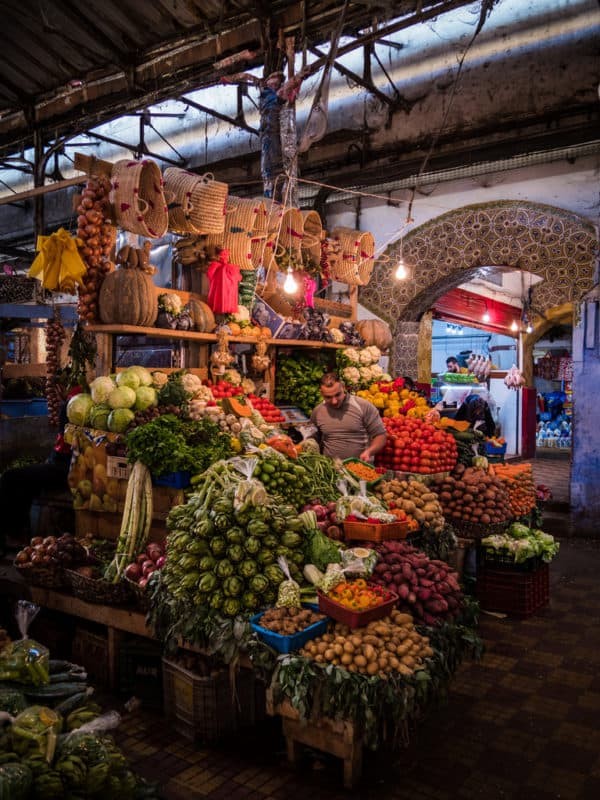 A Moroccan man pours traditional tea, creating an iconic image of hospitality and cultural richness in Morocco during Ramadan
A Moroccan man pours traditional tea, creating an iconic image of hospitality and cultural richness in Morocco during Ramadan
20. Conclusion: Embracing the Beauty of Ramadan in Morocco
Traveling to Morocco during Ramadan is an opportunity to witness a unique convergence of spirituality, culture, and community. While it requires some preparation and respect for local customs, the experience can be incredibly rewarding. With travels.edu.vn as your trusted guide, you can embark on a journey that will enrich your understanding of the world and create memories that will last a lifetime. Let us help you discover the beauty of Ramadan in Morocco!